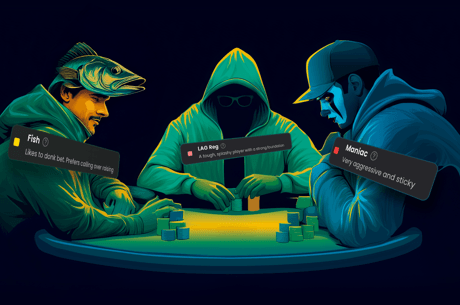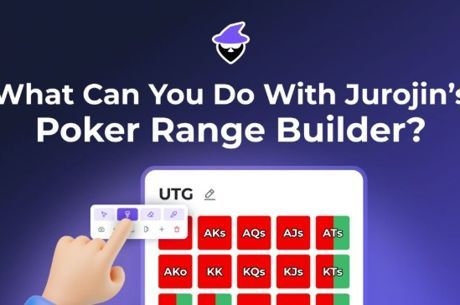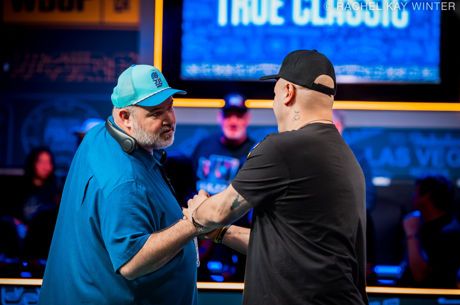Practice and Improve Your Mental Toughness at the Table

A few weeks ago, I touched on how a key component to Daniel Negreanu's success in poker is his goal setting. We later looked at self-awareness, another attribute Negreanu and many other successful poker players share.
Now I want to delve into the third component of poker success which is known as determination or "mental toughness" (as we call it in the mindset biz). You've probably heard the phrase a lot and know people who seem to possess mental toughness. But how exactly does one acquire it? I'm so glad you asked!
Sports psychologist Dr. Graham Jones and his colleagues conducted a series of interviews and focus groups with various types of elite performers to find out how important mental toughness was to their success. He and his group determined that mental toughness is having the natural or developed psychological edge that enables you:
- generally, to cope better than your opponents with the many demands that sport (or intellectual competition) places on a performer; and,
- specifically, to be more consistent and better than your opponents in remaining determined, focused, confident and in control under pressure.
Dr. Jones also concluded that there are 12 attributes that the mentally tough competitor must attain. While all 12 are important and none should be overlooked as they're all interconnected, the items at the top of the list are most critical. Here they are as they relate to developing mental toughness in poker:
- Believe in your gut that you can achieve your goals. An unshakeable belief in your ability will be especially essential when things are not going well. Individuals who have this trait know they can overcome obstacles.
- Be able to bounce back from defeat and setbacks. Learn to use your losses and setbacks as a source of motivation. The road to the top is rarely smooth.
- Believe that you have unique qualities that give you an edge over your opponents. People with this mindset have the confidence to train in ways that best suit them and their needs, even if these methods aren't traditional.
- Have an insatiable desire to succeed. This need should be almost overpowering. It takes a great deal of time and effort to become an elite player, so the desire to meet that goal must be motivated from deeply within.
- Be able to maintain complete focus on the task at hand. In order to be mentally tough, learn how to keep focused no matter what is happening around you.
- Be able to compose yourself rapidly following unexpected, uncontrollable events. Poker comes with a healthy dose of variance and factors that are out of your control. To succeed, learn to compose yourself quickly to get back into the game.
- Be able to get past psychological pain, like fatigue, or emotional pain, like tilt. The goal is to make optimal decisions in every situation, whether you're bright-eyed and bushy-tailed or dead tired and need a seventh Red Bull.
- Believe that you can cope with competition-anxiety effectively. Perhaps it's your first televised final table or you're a favorite to win your first major event and the pressure is on. The pressures of real and/or imagined expectations can be anxiety inducing. Mentally tough players allow the less important details to fall away, and remain focused on their goal.
- Do not be adversely affected by the good or bad performances of other players. It's easy to be swayed by horrid play or impressed by a celebrity or your favorite pro sitting at the table. Forget comparisons. Always strive to play your best.
- Thrive on competition. If you are the type who elevates your game when the occasion calls for it, you have this skill mastered. Being able to perform at your best when the competition is fierce is another sign of mental toughness.
- Remain fully focused even when dealing with personal issues. This one can be tough, but find a way to use these concerns as a source of motivation. Whatever you do, you must keep your head in the game.
- Switch your poker focus on and off as required. While focus is essential when you're playing or studying, it's also important to switch your focus to something completely unrelated when you go on break. Your brain needs a chance to relax, so you are ready to dive in when you return to the game.
All right, so now we know the necessary attributes to be mentally tough. But how do we develop them?
To start, practice mental toughness at the table.
- Come to the table with a strong desire to win.
- Have a clear intention for every session.
- Maintain present focus at the table by being concerned only with the here and now.
- Present a strong image at all times.
- Always keep a positive attitude.
- Even if you have played poorly, you need not accept defeat.
- Plan your hands.
- Take your time in large pots.
- Remain flexible.
- Overcome fear of failure.
- Be on the lookout for situations where you were mentally weak and find ways to improve before you sit down at your next session.
These lists may seem overwhelming, initially. As I wrote in the goal setting article, start small — so small you can't say "no." Use what you've learned in the previous two articles to develop these attributes, and improve your mental toughness. In combination, goal setting, self-awareness and mental toughness will help to catapult you towards success.
And when you get hit with a few bad beats in a row — which will happen — refocus and just remember that facing hardships can be a good mental toughness teacher.
Dr. Tricia Cardner is the author of Peak Poker Performance (with Jonathan Little), available in paperback, audio and e-book formats via Amazon. Take her free online course Rev Up Your Poker Success, a step-by-step guide to designing your best year ever. And for more from Dr. Cardner, visit her website and follow her on Twitter @DrTriciaCardner.










